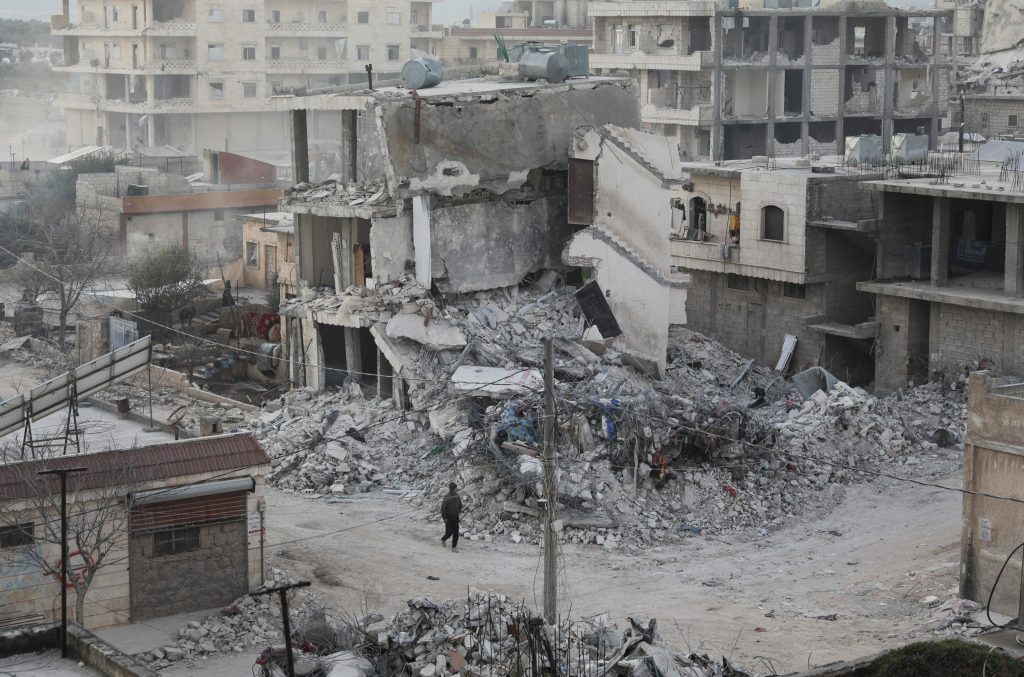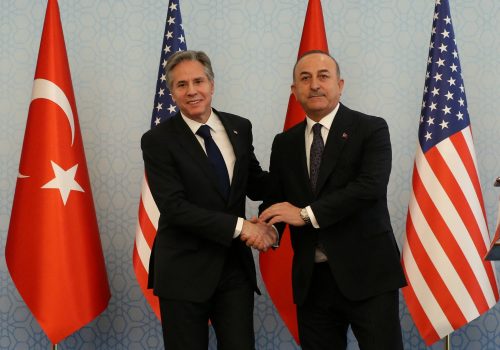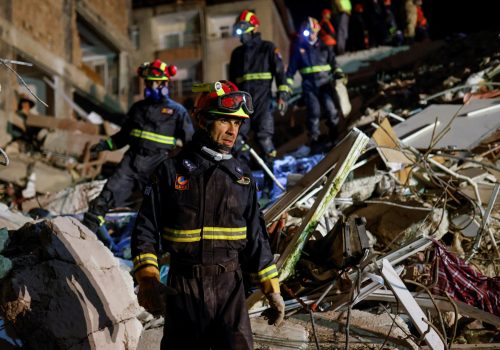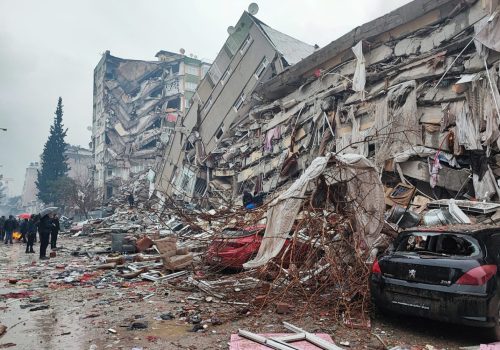Three weeks after devastating earthquakes rattled across Turkey and northwest Syria on February 6, the US House of Representatives approved a resolution mourning the more than 55,000 people who lost their lives (with more than 48,000 of those deaths taking place in Turkey).
The bill, passed by a bipartisan 412-2 vote, was introduced by Congressman Joe Wilson (R-SC), chairman of the House Foreign Affairs Subcommittee on the Middle East, North Africa, and Central Asia as well as co-chair of the Congressional Caucus on US-Turkey Relations and Turkish Americans.
The bill is important for several reasons.
First, it represents a friendly hand extended in support to Turkey from an institution whose Turkey-related actions usually consist of warning or admonishing the country or its government—and whose tone has reflected strained relations in recent years.
Second, the bill is a reminder of the forgotten circumstances of Syrians in the Syrian opposition-held northwest. Before the earthquakes, over 4.5 million people in northwest Syria—including 2.9 million internally displaced people—already faced precarious situations after more than a decade of war, cold, and disease. The earthquakes made support for them even more urgent.
While rescue teams and assistance from all over the world arrived quickly in Turkey, it took many days for rescue teams and help to access Syria’s northwest—the part of the country most damaged in the earthquake. The aid that was dispatched immediately following the earthquake, including at least two dozen shipments of disaster relief aid, was sent to the regime of Syrian President Bashar al-Assad in Damascus and none reached opposition-controlled areas in northwest Syria in the first week.
Third, against that backdrop, the bill is also a warning to the Assad regime. It accuses the regime of “cynically exploit[ing] the disaster to evade international pressure and accountability, including by preventing the United Nations from providing assistance through multiple border crossings between [Turkey] and Syria.” The bill also calls upon the Biden administration to use diplomatic tools “to open all [Turkey]-Syria border crossings for United Nations assistance”; and calls for an oversight mechanism “to ensure that United States-funded assistance is not diverted for the benefit of the Assad regime.”
Finally, the bill signals that the United States is watching the region’s geopolitical currents closely, at a time when Russia in particular is trying to stitch together an understanding between Turkey and Syria.
A history of politicized aid
The humanitarian response in Syria has been politicized and exploited throughout the war by the Assad regime and its supporters. Already in 2014, the United Nations Security Council (UNSC) Resolution 2165—which set the legal framework for the UN to deliver cross-border humanitarian aid from four crossings on Syria’s borders with Jordan, Iraq, and Turkey—highlighted that the body was “deeply disturbed by the continued, arbitrary, and unjustified withholding of consent to relief operations and the persistence of conditions that impede the delivery of humanitarian supplies to destinations within Syria, in particular to besieged and hard-to-reach areas.” Over the years, Russia’s attempts at the UNSC to limit cross-border aid and thus legitimize the Syrian regime’s territorial control have led to a continuous reduction in the number of allowed crossings. Eventually, in July 2020, only the Bab al-Hawa crossing from Turkey was renewed.
Following the earthquake, this sole crossing was not used for three days due to damaged roads and logistical problems, and the UN only started using other crossings following the Assad regime’s approval—even though some observers, as well as members of the UN-appointed commission of inquiry, believe the UN did not need the green light from Damascus. The post-earthquake relief work also revealed the UN’s tangled relations with the regime.
According to UN data, at least 148 cities and towns in northwest Syria have been affected by the earthquakes. The region is divided into territories governed by the regime: the former al-Qaeda affiliate Hayat Tahrir al-Sham (HTS) and the Turkey-backed Syrian National Army (SNA).
While a 2020 ceasefire in Idlib saved many lives and brought relative calm to the region, the stability has been hampered several times mainly because of infighting among SNA factions and HTS’s attempts to expand its area of influence. In many cases, these incidents resulted in Turkey attempting to mediate among groups or in the Turkish army intervening to end the violence and bring the groups all to their assigned areas, as was the case last October. Therefore, Turkey’s intervention was limited to maintaining the status quo.
In the weeks after Assad agreed to open two more crossings to facilitate the delivery of aid, many countries and UN agencies provided truckloads of aid to the region. The UN launched a call for $397 million in aid support for Syria, while US Secretary of State Antony Blinken—during his first official visit to Turkey on February 19—toured the earthquake-hit areas around Hatay Province. He also visited Incirlik Airbase, met US search and rescue teams, and announced an additional $100 million in aid for the recovery, bringing total US assistance in response to the earthquake to $185 million.
Moves on the region’s chessboard
The United States and Turkey have been at odds with each other in Syria as the United States has supported the Syrian Democratic Forces (SDF) in its fight against the Islamic State in Syria, while also pushing back on Iran and dealing with Assad and Russia.
The SDF is dominated by the People’s Protection Units (YPG): the Syrian branch of the Kurdistan Workers’ Party (PKK), which is recognized by the United States and the European Union as a terrorist organization and which Turkey has been fighting for almost forty years. That’s why Turkey has launched three operations in northern Syria to create a “safe zone” in the region with the aim of securing its borders and enabling Syrians in Turkey to voluntarily return to Syria.
Turkey has been signaling its intent to launch another incursion into northern Syria since May 2022, and the United States, Russia, and Iran have all publicly declared their objection to such an attempt. Russia instead has been trying to mediate between Turkey and Syria for the normalization of ties between the two countries.
In December 2022, Turkish, Syrian, and Russian defense ministers and intelligence chiefs met in Moscow, the first ministerial-level meeting between Turkey and Syria in over a decade. The United States and the Syrian opposition, including the Syrian Interim Government and HTS, are against a normalization between Turkey and the Assad regime. Following the talks in December, demonstrations took place in various opposition-held cities in the Aleppo and Idlib governorates to protest the Turkish rapprochement with the regime.
During a recent visit by the Iranian foreign minister to Ankara, the Turkish foreign minister announced that the deputy foreign ministers of Russia, Turkey, Syria, and Iran (who was invited after expressing resentment about not being included) would meet in Moscow. A meeting scheduled for March 15 was then postponed for “technical reasons” following a meeting the day before between Russian President Vladimir Putin and Assad in Moscow on the twelfth anniversary of the anti-regime uprising.
It’s clear that the earthquake has helped Assad politically and financially.
Assad’s say over border crossings, and therefore his control over these territories, has effectively been recognized by the UN. He got a 180-day exemption to Syria sanctions for disaster aid from the United States, even though US sanctions never targeted humanitarian assistance in the first place. And he received international assistance and political support, including in the form of visits by foreign ministers of the United Arab Emirates, Egypt, and Jordan.
However, none of those visits would be as important as Turkey fully normalizing relations with the regime, which would be a strategic gain for Assad and his supporter, Putin.
It is unclear whether Erdoğan is engaging in a political maneuver ahead of upcoming elections this May to save face with an electorate that, while divided over many issues, is seemingly united in their opposition to Syrian refugees staying in Turkey. Normalization with Assad would facilitate the return of Syrians to their country. Turkey is the world’s largest refugee-hosting country and hosts 3.6 million Syrians alone.
While the US bill mourning the lives lost in the earthquakes rightly recognized “[Turkey’s] continuing support to Syrian refugees in [Turkey] and in northwestern Syria,” it is worth highlighting that any deal between Syria, Turkey, and others trying to mediate (including Iran and Russia) seems not only unrealistic in the near future (because of the parties’ conflicting expectations) but also unproductive for Turkey, the future of Syria, the Syrians in the northwest, and the Syrians in Turkey.
It is clear that both Syrians in the northwest of their country and in Turkey will need continuous humanitarian support in the coming year. The earthquake has brought the forgotten fate of Syrians and of Syria to the forefront of the US agenda in the region. They must not be forgotten again.
Pınar Dost is the deputy director of the Atlantic Council IN TURKEY program. Follow her on Twitter @pdosting.
Further reading
Mon, Feb 27, 2023
Experts react: What did Blinken accomplish in Turkey and Greece?
TURKEYSource By
Atlantic Council experts give their perspective on US secretary of state's visit to Turkey and Greece in the aftermath of Turkey's devastating earthquake.
Tue, Feb 14, 2023
Post-earthquake disaster diplomacy can help repair US-Turkey ties
TURKEYSource By Grady Wilson
Turkey's allies and partners must continue to offer help and solidarity in dealing with the horrific earthquake. And for the United States, there's a significant opportunity for public diplomacy between two troubled allies.
Mon, Feb 6, 2023
Experts react: How the world should respond to the devastating earthquake in Turkey
New Atlanticist By
How can the international community help? What will the impact be for a region already reeling from a decade-long war and refugee crisis?
Image: A person walks past damaged buildings, in the aftermath of an earthquake, in rebel-held town of Jandaris, Syria February 15, 2023. REUTERS/Khalil Ashawi



